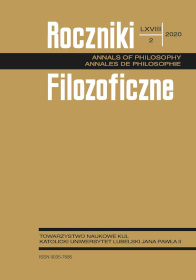Epistemic Functions of Intuition in Descartes
Epistemic Functions of Intuition in Descartes
Author(s): Monika WalczakSubject(s): Philosophy, History of Philosophy, Epistemology, Renaissance Philosophy, Early Modern Philosophy
Published by: Towarzystwo Naukowe KUL & Katolicki Uniwersytet Lubelski Jana Pawła II
Keywords: intuition; epistemic functions; cognition; knowledge
Summary/Abstract: The topic of the paper is the notion of intuition in Descartes’ philosophy and its epistemic functions. Descartes introduces his notion of intuition in the context of a description of his method and process of knowing and doing science. Intuition is a significant component of this process. I intend to show that the main epistemic functions of intuition in Descartes’ philosophy are differentiated. Intuition is essential not only in the context of justification (the Cartesian synthetic method of proof) but also and especially in the context of discovery (the Cartesian analytic method of discovery). It plays not only a role in the foundation of the cogito but also on different stages of constructing the system of knowledge. Intuition has important functions in grasping simple natures, forming primary concepts, comprehending complex natures, forming primary propositions (including primary principles), and capturing relationships between them and building deductive reasoning (the role of intuition in deduction). Hence, intuition is the foundation for all primary stages of producing knowledge. It is active and important element of pure thinking (a priori) in human knowledge, and science. It fulfils these functions due to its specific epistemic properties. I also argue that intuition is not an autonomous and complete type of knowledge. Nor is it an intuitive thesis, but rather the basis of a justification for theses (including the cogito).
Journal: Roczniki Filozoficzne
- Issue Year: 68/2020
- Issue No: 2
- Page Range: 43-61
- Page Count: 19
- Language: English

